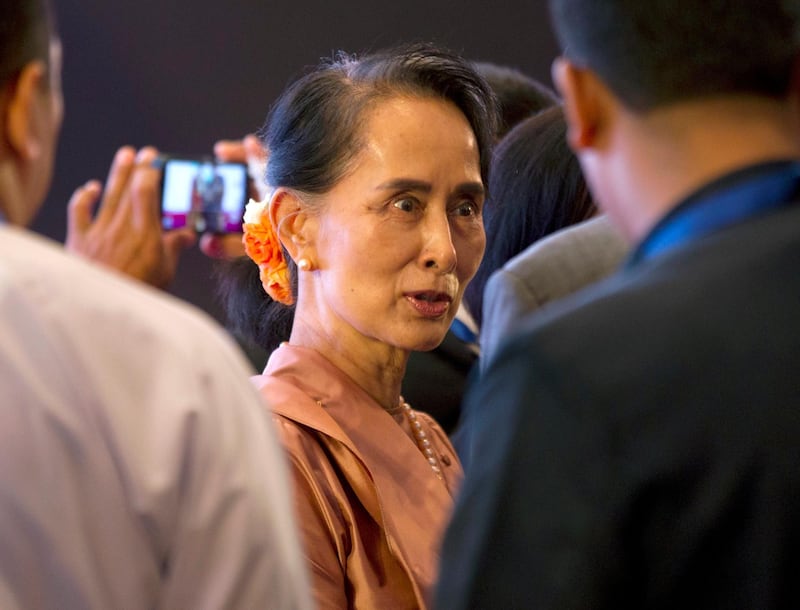Known as Asia's Mandela, Aung San Suu Kyi was lauded on the global stage, awarded a Nobel Peace Prize and regarded as a guardian of democracy.
Now, she has been striped of her Freedom of Dublin award in the latest in a string of setbacks as the West rebukes Mrs Suu Kyi for ignoring the persecution of Myanmar's Rohingya Muslims.
This Burmese politician, diplomat, and author has broken down barriers for women by blazing a trail through the echelons of domestic power and has risen to become the first State Counsellor and de facto ruler of Myanmar.
Once regarded as a peaceful protester, she was praised for refusing to incite violence while she was forced under house arrest for 15 years after winning a presidential election the ruling military refused to acknowledge.
Many world leaders now hold her responsible for the fate of the half a million Rohingya who have fled to Bangladesh following recent violence.
__________________
Read more
[ Britain didn’t do enough to rally world behind Rohingya: MPs ]
[ UN will be involved in Rohingya repatriation, Bangladesh says ]
__________________
Over 620,00 Rohingya Muslims have been driven from Rakhine state in western Myanmar into neighbouring Bangladesh by the military. The United Nations has described the actions as a “textbook example of ethnic cleansing”. Aid group Doctors Without Borders says at least 6,700 Rohingya were killed between August and September in Myanmar.
In response, Dublin has voted to revoke Aung San Suu Kyi's Freedom of Dublin City award, a month after musician Bob Geldof handed back his Freedom of Dublin award last month to protest against the inclusion of Mrs Suu Kyi on the honours list.
The news comes just over two weeks after Oxford, where the Burmese leader attended university, formally stripped her of the Freedom of the City of Oxford award.
Oxford city council voted unanimously to permanently remove the honour and said it did not want to celebrate “those who turn a blind eye to violence”.
Almost half a million people have signed a petition asking the The Norwegian Nobel Committee to revoke her award and a clip of the Bangladesh's leader, Sheikh Hasina, condemning Myanmar and saying her country would continue to offer sanctuary to the forcibly displaced Rohingyas has been widely viewed and quoted.
Addressing the UN General Assembly (UNGA) in September she said: "I have come here just after seeing the hungry, distressed, and hopeless Rohingyas from Myanmar," she said from the podium.
"We are horrified to see that the Myanmar authorities are laying landmines along their stretch of the border to prevent the Rohingya from returning to Myanmar," Mrs Hasina said, as she called for safe zones to be enforced to allow the population to return to their homes.
Mrs Suu Kyi missed the UNGA this year, with her office citing the Rohingya crisis as the reason.
In September fellow peace prize holder Desmond Tutu wrote an open letter to Mrs Suu Kyi on social media and called on her to end the military-led operations.
The 85-year-old archbishop said the “unfolding horror” and “ethnic cleansing” had left him no choice but to speak out against the woman he said he admired and considered “a dearly beloved sister”.
“As we witness the unfolding horror we pray for you to be courageous and resilient again. We pray for you to speak out for justice, human rights and the unity of your people. We pray for you to intervene in the escalating crisis and guide your people back towards the path of righteousness again,” he wrote.
Criticism of Mrs Suu Kyi has slowly built up as her reputation has steadily receded.
A turning point in the West’s view of the Burmese leader was during a 2013 interview with the BBC during which she she dismissed questions about rising violence against the Rohingya, saying that Buddhists had also been displaced from their homes. Asked why the violence had overwhelmingly affected Muslims, she replied saying that Buddhists lived in fear of “global Muslim power.”
In May 2015, the Dalai Lama publicly called upon her to do more to help the Rohingya people. He said he has raised the issue in two separate private meetings previously.
In December 2016, more than 20 Nobel Peace Laureate and influential figures signed an open letter to the United Nations demanding action to end the Rohingyas crisis.
In the statement, they wrote: “Despite repeated appeals to Daw Aung San Suu Kyi we are frustrated that she has not taken any initiative to ensure full and equal citizenship rights of the Rohingyas”.
OPEN LETTER TO THE PRESIDENT OF THE SECURITY COUNCIL AND MEMBER COUNTRIES OF THE COUNCIL TO END THE HUMAN CRISIS OF...
Posted by Muhammad Yunus on Thursday, December 29, 2016





